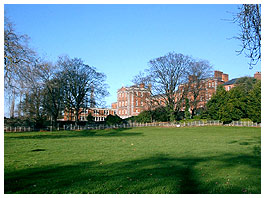 St Vincent's Hospital, Fairview
St Vincent's Hospital, Fairview
Research
Research in Progress
Cardiovascular function in patients taking Clozapine
Treatment with the antipsychotic drug Clozapine is associated with sinus tachycardia in about 25% of patients. In less than 0.1% of cases, Clozapine therapy can also be associated with myocarditis and cardiomyopathy, often occurring within weeks of drug initiation. The mechanisms for these cardiac side effects are not well known, however it is hypothesized that Clozapine therapy may, in rare cases, cause a drug-induced eosinophilic reaction which may affect cardiac tissue, as well as kidney nephrons. The short and long-term effects of Clozapine-induced sinus tachycardia on cardiac ventricular function, on the other hand, are not well understood, and have not been adequately studied. Currently no clear guidelines or safety monitoring standards exist for patients exhibiting clozapine-associated tachycardia. The objective of this clinical study is to examine cardiac ventricular and electrical function, in patients on Clozapine therapy, to determine whether Clozapine-Associated Tachycardia patients may exhibit signs of subclinical left ventricular dysfunction.
Investigators: Niall Mahon, Andy Roy and Joe Galvin of the Dept. of Cardiology, Mater Hospital Eccles St Dublin 7.
Investigating Inflammatory Biomarkers in Schizophrenia
Dr. Kara O’Connell who is based at the Neuroscience Centre, St. Vincent’s Hospital Fairview, Richmond Road, Dublin 3, Ireland has enrolled for a PhD with TCD on this project. The objective of this study is to determine whether there are differences in inflammatory markers between healthy controls and people with schizophrenia, particularly those on Clozapine, an atypical antipsychotic noted to have potentially metabolic adverse effects. The target populations include those with established schizophrenia on Clozapine, prodromal subjects, first episode drug naïve patients and unaffected siblings of those with schizophrenia.
Investigators: Prof. Kumlesh K. Dev, Molecular Neuropharmacology, Department of Physiology, Trinity College Institute of Neuroscience (TCIN), Medical School, Trinity College Dublin, Dublin 2, Ireland.
Psychosocial / Psychoeducational Intervention for people with recurrent Suicide Attempts (PISA): A Pilot Randomised Control Trial of Effectiveness, Individual Response and Acceptability
This is a Health Research Board funded collaborative study between Dublin City University (DCU) and 4 clinical sites to examine the effectiveness of a new group intervention for people with recurrent suicide attempts called PISA. PISA, developed in Canada, is a 20 week group programme that runs weekly, with each session lasting 1½ hours. Participants in the study are randomly allocated to either treatment as usual (TAU) plus PISA or TAU only. Participants will be randomly allocated to one or other treatment arm of the study: hence, they have a 50% chance of receiving regular treatment only and a 50% chance of being offered TAU plus PISA treatment. Outcome measures will be compared to assess the effectiveness of PISA and to examine correlations with individual response to PISA and the study will also evaluate the acceptability of PISA to participants and group facilitators.
Maeve Kenny (01) 8842475 or Katarina Timulakova (01) 8842409 are the local psychologists attached to the project.
Foundation Grants
- Awarded PI of Proof of Concept grant from Enterprise Ireland. Project Title: Alcohol Intake: An acoustic-based detection system. €92123. Awarded Summer 2008. PC/2008/0159.
- Dr. Richard Reilly (School Electrical, Electronic & Mechanical Engineering, University College Dublin) and Dr Thakore has been awarded a Proof of Concept grant from Enterprise Ireland. €80 000. Awarded - Spring 2006. PC2006/003.
- Dr. Sherlyn Yeap was awarded a Health Research Board Clinical Research Training Fellowship scheme. Project title: The Search for an endophenotypic marker in schizophrenia: high-density electrical mapping. Award details: €172894.27 over 2 years. Awarded – 2006. HRB CRT/2006/8.
